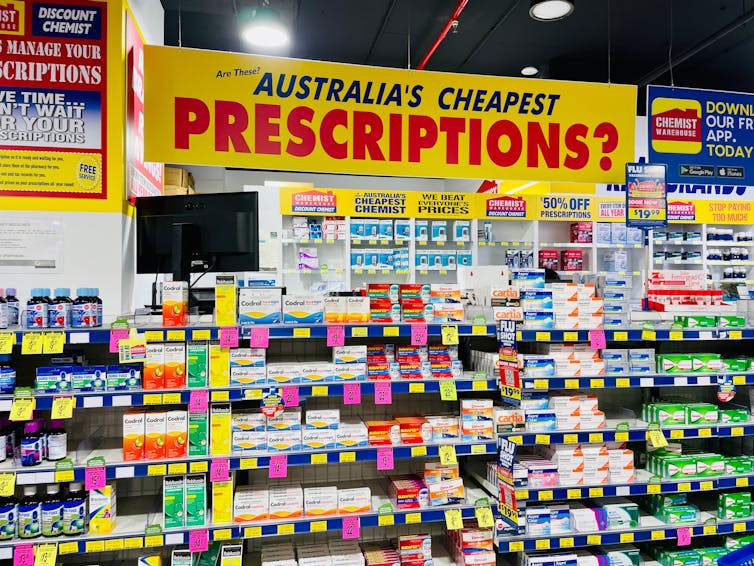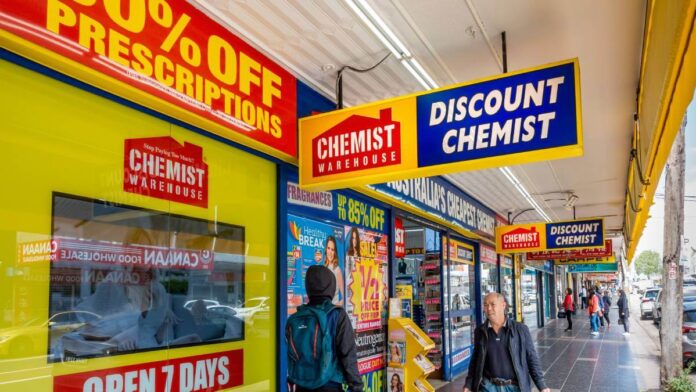Corporate Australia loves a big merger. And amid a growing flurry of them across the business scene, a new blockbuster has emerged.
All eyes are on two titans of the pharmacy industry – Chemist Warehouse and Sigma Healthcare. They are poised to join forces under an $8.8 billion deal, which could radically reshape the way Australians access medication and other health products.
Mergers can lower business operating costs and make companies more efficient. But reduced competition in any sector typically leads to higher prices for consumers.
What could this deal by ‘Australia’s cheapest chemist’ mean for everyday Australians and their wallets?
An unmatched pharmacy giant
If the proposed merger goes ahead, the new entity will be enormous – far bigger than any of its individual competitors.
It will combine the market power of about 600 existing Chemist Warehouse outlets with more than 1200 pharmacies currently aligned to Sigma as a wholesaler, giving it more than 26 per cent market share.
Sigma is listed on the Australian Stock Exchange (ASX), meaning its shares can already be bought and sold by the public.
Through the merger, privately owned Chemist Warehouse, whose surging profits have excited potential investors, will also get a backdoor entrance to the ASX without undergoing a lengthy initial public offering process.
Who the players are
Chemist Warehouse has earned a reputation as the ‘Bunnings of pharmacies‘, famous for its perceived affordability.
It has established a strong retail presence nationally, with franchise outlets stocking not only prescription and over-the-counter medicines, but also a huge range of other health products such as vitamins, cosmetics and toiletries.
Sigma Healthcare, on the other hand, operates retail pharmacy chains including Amcal and Discount Drug Store.
It is also one of top three largest pharmaceutical wholesalers in Australia, with a broad customer base.
This merger is a masterful blend of two business strategies:
- vertical integration – buying part of your own supply chain
- horizontal integration – acquiring a competing business.
The new entity will be able to independently source and sell its own products, fully controlling its own ecosystem of wholesale, distribution and retail pharmacies.
How could this affect competition and consumers?
Economic theory tells us that for consumers, mergers can be a double-edged sword.
On the one hand, they often increase business efficiency, scale and bargaining power. These cost savings may translate into lower prices for consumers.
In some industries, mergers have reduced prices by more than 5 per cent.
However, the decrease in competition brought about through a merger can allow companies to get away with charging higher prices, or even lowering the quality of their product offering.
Evidence from the US shows that in the consumer packaged goods sector, which includes drugs and other healthcare products, mergers increased prices by 1.5 per cent on average and lowered the total volume of goods sold by 2.3 per cent.

In Australia, tight regulation of prescription medications means there isn’t much leeway to increase prices for medicines covered under the Pharmaceutical Benefits Scheme (PBS).
But Chemist Warehouse earns a whopping 67 per cent of its revenue from its non-prescription ‘front of store’ sales, compared to a rate of 27 per cent at other Australian pharmacies.
This gives the giant a unique opportunity to capitalise on increased market power in the Australian context.
Calls to increase competition
There have long been calls to enhance competition in Australia’s pharmacy sector.
The Harper National Competition Policy Review singled out the Community Pharmacy Agreement for stifling competition, saying its rigid location and ownership restrictions pose significant barriers for new players.
This has largely prevented Australia following in the steps of the United States and Europe, where deregulation in this industry has allowed consumers to buy over-the-counter medicines in supermarkets and gas stations.
This merger stands to further weaken competition in an industry already held back by such restrictions.
Australian retail is already highly concentrated
Australia’s high level of industry concentration – where markets are controlled by a small number of large players – has found itself in the spotlight amid a stubborn cost-of-living crisis.
One way to assess market concentration is to measure the share of the market held by the top four companies.
In Australia, the top four players in the pharmacy sector collectively hold over 50 per cent of the market.
As industry concentration has intensified across other sectors, many larger Australian corporations have been seen to increase their price mark-ups and suppress wage growth.
If successful, this merger will further entrench the pharmacy sector among banks, supermarkets and petrol retailers in the ranks of the most concentrated Australian industries.
Will it go ahead?
There are still significant hurdles for this merger to go ahead.
The move has to be approved by shareholders in both companies and. more importantly, receive a green light from the ACCC, Australia’s competition watchdog.
Submissions to the ACCC’s formal inquiry into the merger will close this week.
However, the ACCC has struggled to block similar mergers in the past, such as the seismic ANZ-Suncorp deal that was finally approved in February. Regulatory obstacles alone may not be enough to prevent this consolidation.
Australians have a vested interest in a healthy competitive landscape. Reduced competition in the pharmacy sector will affect the pricing pressures on every store, not just the major players.
Don’t be surprised down the road if a visit to your local pharmacy shocks you with pricier cosmetics, sunglasses and even jellybeans!
Angel Zhong, Associate Professor of Finance, RMIT University
This article is republished from The Conversation under a Creative Commons licence. Read the original article.
What do you think the outcome of the merger will be? Why not share your opinion in the comments section below?
Also read: These medicines are now cheaper, and there’s more to come


This merger should not be allowed to happen- it will exactly move the pharmacy business into a dominant player who can move the market in the direction it wants. I think that Chemist Warehouse already has too much market share and is putting the normal local pharmacy under substantial pressure. Although I shop at Chemist warehouse for items like health supplements because they are basically selling these items at wholesale prices. As a general rule I try to buy certain other itemes at the local pharmacy and all my prescriptions.
Combining such a large wholesaler and a the largest retailer will further reduce the local pharmacies.
Personally, I don’t think this merger should be allowed. It gives them more dominance in the pharmacy sector – we already have the big 4 banks, will it be the big 1 or 2 for pharmacies now. I always go to my local pharmacist for the family’s presciptions now as I used to go to Chemist Warehouse and be treated like a number – put your script in, pick it up, and if you need to ask something it will depend how busy the dispensery is. My local pharmacist knows our history and takes time with all of his customers to answer questions without feeling rushed. It’s been months since I’ve stepped foot inside Chemist Warehouse, as I can find supplements and other items by googling the cheapest or waiting for a sale to happen with other stores. If you don’t support the local pharmacy or stores all small businesses are put at risk of closing and when they do please don’t whinge about the fact there is no competition.
It’s about time we learnt from the Woolies Coles duopoly. Government’s allowed them to gobble up the smaller chains and independents and what is everyone, the government and ACCC complaining about now? Lack of competition. Yes the government is always salivating at the prospect of yet another cashed up lobbyist leaving a brown paper package to get their retired result but just once think the long term costs to the people you’re actually paid to serve.
If you think this a cynical view, why did the government resist a banking Royal Commission; why did we get increased power prices from our own coal and gas; why can’t gambling be brought under control; foreign miners get massive fuel rebates; and large foreign and local companies get away with paying no tax year after year.